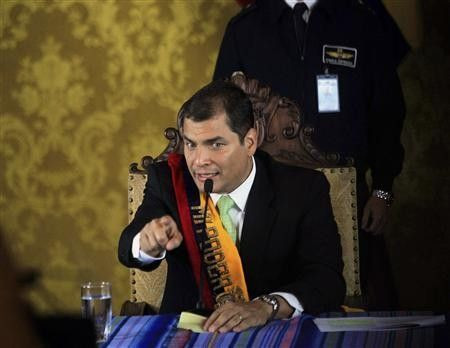Correa: Brits Could End Assange Standoff 'Tomorrow'

Ecuador's standoff with with Britain over Julian Assange "could be ended tomorrow" if London would give the WikiLeaker safe passage to Ecuador, President Rafael Correa said Thursday.
If not, the situation "could go on for months and years," Correa told the BBC.
Ecuadorian Embassy officials in London said Thursday they had had no contact with British officials for a week, after the country granted asylum to the Wikileaks founder, who is fighting extradition to Sweden.
On Thursday, however, the Foreign Office sent the London officials a letter.
Assange, 41, has been at Ecuador's London embassy since June in a bid to avoid being sent to Sweden to answer sex assault claims, which he denies.
In an interview with the BBC, Correa said: "This could end tomorrow if the UK grants safe passage, or it could go on for months and years if Mr. Assange can't leave the embassy of Ecuador in London."
During the London embassy briefing, Ecuadarian officials said they were hopeful a "compromise" could be found but said the Australian could stay inside the London embassy for "as long as it takes".
"He can stay here for eight years ... two centuries. However long he wants," said one diplomat.
An Ecuadorian embassy official added: "The [British] Foreign Office has been contacting many South American countries in the past week indicating they wanted to open conversations again with the Ecuador government - but they have made no approach."
Foreign ministers from across South America are due to meet on Friday to discuss the situation.
A draft resolution from the Organization of American States calls on the UK to comply with the 1961 Vienna Convention on Diplomatic Relations and to respect the "inviolability" of the embassy. The British Foreign Office has been lobbying South American states to abstain. On Thursday, however, one Ecuadorian official predicted London's efforts were doomed, adding: "Most Latin American countries are working as one."
Ecuadorian diplomatic sources told The Guardian there had been no secret deal in advance to grant Assange asylum. They said he simply turned up at the front door at midday June 19 and rang the bell. The Ecuadorian ambassador, Ana Alban, was forced to dash home to fetch a blow-up mattress for Assange to sleep on. Since he took up residence, the embassy had got a bigger refrigerator, the sources said.
© Copyright IBTimes 2024. All rights reserved.




















